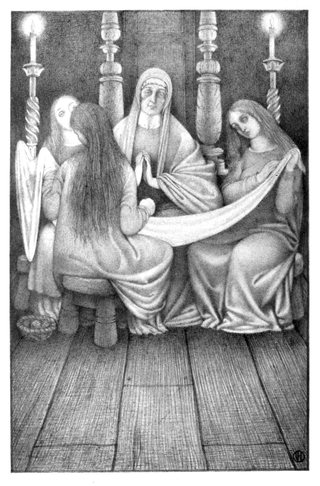Related Research Articles

In mythology, folklore and speculative fiction, shapeshifting is the ability to physically transform oneself through unnatural means. The idea of shapeshifting is found in the oldest forms of totemism and shamanism, as well as the oldest existent literature and epic poems such as the Epic of Gilgamesh and the Iliad. The concept remains a common literary device in modern fantasy, children's literature and popular culture. Examples of shapeshifters are vampires and werewolves.
"Lady Isabel and the Elf Knight" is the English common name representative of a very large class of European ballads.

"The Two Sisters" is a traditional murder ballad, dating at least as far back as the mid 17th century. The song recounts the tale of a girl drowned by her jealous sister. At least 21 English variants exist under several names, including "Minnorie" or "Binnorie", "The Cruel Sister", "The Wind and Rain", "Dreadful Wind and Rain", "The Bonny Swans" and the "Bonnie Bows of London". The ballad was collected by renowned folklorist Francis J. Child as Child Ballad 10 and is also listed in the Roud Folk Song Index. Whilst the song is thought to originate somewhere around England or Scotland, extremely similar songs have been found throughout Europe, particularly in Scandinavia.
"Young Beichan", also known as "Lord Bateman", "Lord Bakeman", "Lord Baker", "Young Bicham" and "Young Bekie", is a traditional folk ballad categorised as Child ballad 53 and Roud 40. The earliest versions date from the late 18th century, but it is probably older, with clear parallels in ballads and folktales across Europe. The song was popular as a broadside ballad in the nineteenth century, and survived well into the twentieth century in the oral tradition in rural areas of most English speaking parts of the world, particularly in England, Scotland and Appalachia.
Fair Annie is a traditional folk ballad, existing in several variants.
"Young Hunting" is a traditional folk song, Roud 47, catalogued by Francis James Child as Child Ballad number 68, and has its origin in Scotland. Like most traditional songs, numerous variants of the song exist worldwide, notably under the title of "Henry Lee" and "Love Henry" in the United States and "Earl Richard" and sometimes "The Proud Girl" in the United Kingdom.

"Lord Thomas and Fair Annet", also known as "Lord Thomas and Fair Eleanor", is an English folk ballad.
"The Fair Flower of Northumberland" is a folk ballad.

Fause Foodrage is a Scottish murder ballad of the 17th or 18th century. It was first printed by Walter Scott in Minstrelsy of the Scottish Border (1802). Scott cited Elizabeth, Lady Wardlaw as the ballad's probable author.
"Gil Brenton" is an English-language folk song, existing in several variants.
Brown Robin is a traditional English-language folk song. The ballad tells the story of a king's daughter who brings her lover, Brown Robin, into the castle and back out without being discovered by the king. The second variant comes from the ballad "Love Robbie."
"Erlinton" is an English-language folk ballad. One variant features Robin Hood, but this variant forces the folk hero into a ballad structure where he does not fit naturally.
"Earl Brand" is a pseudo-historical English ballad.
Sweet William's Ghost is an English ballad and folk song which exists in many lyrical variations and musical arrangements. Early known printings of the song include Allan Ramsay's The Tea-Table Miscellany in 1740 and Thomas Percy's Reliques of Ancient English Poetry in 1765. Percy believed that the last two stanzas of the version he published were later additions, but that the details of the story they recounted were original.

Sir James the Rose is Child ballad 213. It was published as a broadside ballad.
Clerk Saunders is an English-language folk song, likely originating somewhere in England or Scotland. It exists in several variants.
The West Country Damosel's Complaint is a traditional English or Scottish ballad that is part of the Child Ballad anthology.

"The Twa Brothers" is a traditional ballad existing in many variants.
"Proud Lady Margaret" is an English-language folk song.

"The Dowie Dens o Yarrow", also known as "The Braes of Yarrow" or simply "Yarrow", is a Scottish border ballad. It has many variants and it has been printed as a broadside, as well as published in song collections. It is considered to be a folk standard, and many different singers have performed and recorded it.
References
- ↑ Francis James Child, English and Scottish Popular Ballads, "Young Johnstone"